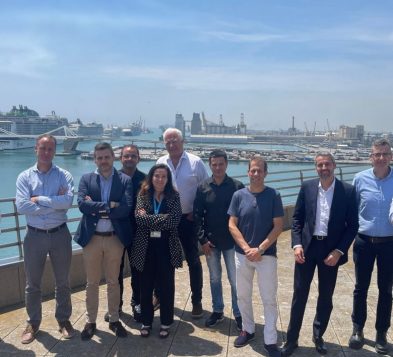Onshore power supply system to be installed at Port of Barcelona
Thanks to a project initiated by the Port of Barcelona and VINCI Energies Spain, Barcelona’s ferry terminal will have two berths with onshore power supply systems, providing vessels with 100% renewable energy.
The Port of Barcelona and VINCI Energies have launched construction works on an onshore power supply (OPS) pilot project for vessels at Barcelona’s ferry terminal. The contract, won by a consortium comprising several VINCI Energies business units (Tecuni SAU, Inove Ingenieria SA, GTIE Synertec SAS and Actemium Electro AB), is part of the first phase of Nexigen, the Port of Barcelona’s dock electrification plan. The tender covers the development and execution of the project as well as ship connection and disconnection services, and maintenance of the facility.
As of September 2024, the port will have two berths with cold ironing systems running on fully renewable energy. This means that vessels will be able to shut down their engines while berthed and avoid releasing pollutants.
Ana Arévalo, energy transition manager in the Barcelona port team overseeing the pilot project, explains that with the start of installation works for the OPS system at the ferry terminal, “we are continuing to move forward with the electrification process. It’s another important milestone for the port. There is still much to be done but the meeting with our partner went very well. VINCI Energies has substantial experience in developing onshore power supply systems and we are convinced that we can deliver a cutting-edge project.”
Alejandro García, hydrogen and ports director at VINCI Energies Spain, highlights the importance of the project: “It will enable the Port of Barcelona to benefit from the knowledge and experience of VINCI Energies in implementing this type of system and will deliver operational advantages to ferries that dock there and to the environment of the city of Barcelona.”

VINCI Energies has been involved in the rollout of 39 onshore power supply systems worldwide (21 in Sweden, 11 in France, 4 in Norway, 2 in the United Arab Emirates and one in Denmark). These have resulted in a significant improvement in quality of life in the cities concerned, reducing noise and polluting emissions. According to calculations carried out by Puertos del Estado, the Spanish state ports agency, the system achieves an emission reduction per ship of 96% in nitrogen oxides, 8% in sulphur oxides, 94% in particulate matter and 64% in carbon dioxide.

